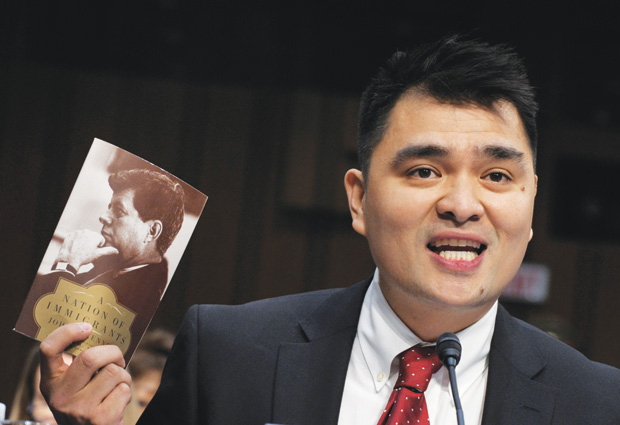Immigrant rights activist and gay man Jose Antonio Vargas calls on LGBTs to reach out to immigrants
Born in the Phillipines, Jose Antonio Vargas has lived in the United States since he was 12. He has been open about his “undocumented” status — his mother sent him to live in the U.S. with his grandparents without the proper documents authorizing him to live here permanently — since 2011.
But he was never detained by authorities over his undocumented status — not, that is, until July 15 when he tried to leave the Texas border town of McAllen.
Vargas, an openly gay Pulitzer Prize-winning journalist who has become one of the leaders of the national immigrant rights movement, was in McAllen to highlight the plight of children fleeing from violence in their Central American homelands.
More than 57,500 unaccompanied children and teens have been caught crossing the U.S. border illegally since last October, and that number is expected to rise. Many of them turn themselves in to authorities as soon as they get into the U.S., hoping to find asylum and protection from the drug gangs wreaking havoc in their own countries.
The issue of the young refugees has become a political flash point. Those on one end of the spectrum are demanding the children be packed up and shipped back home immediately. At the other end are those who insist the children are political refugees who face certain harm or death if they are returned, and as such deserve asylum here.
In a telephone interview Wednesday with Dallas Voice, Vargas — who will be in Dallas Saturday and Sunday for events hosted by Cathedral of Hope and Hope for Peace and Justice — said it is an issue that should transcend partisan, and any other, differences.
“This is a crisis, a humanitarian crisis,” Vargas said. “We have to begin creating the kinds of spaces where people can talk about this in a non-political way, a non-inflammatory way.”
Vargas praised Dallas County Judge Clay Jenkins, who has offered to shelter some 2,000 of the refugee children, for offering the “kind of welcoming and compassionate voice” the children need. “We have to highlight those voices when we can find them,” Vargas said. “We need more people adding their voices to that effort, especially when we see so many images now of angry Americans” calling for the children to rounded up and deported.
Vargas said he believes LGBT people are and should be at the forefront of those stepping up to help, because “the immigrant rights movement and the LGBT movement really have a lot in common. Both movements are about the fight for dignity, the fight to just be able to exist peacefully.
In both cases, it’s about an issue of legality.”
The LGBT community has made great strides toward equality, especially in the last 10 years, Vargas said. “In 2004, George W. Bush built his presidential re-election campaign around his opposition to [same-sex marriage],” he said. But just 10 years later, the LGBT community is on the brink of winning marriage equality.
“That’s just in 10 years,” Vargas said. “It seems like it is happening so fast that we’ve almost gotten whiplash. In just 10 years, we’re living in a new kind of atmosphere, where it is considered unacceptable to be homophobic. Yes, there are places, especially in the South, where homophobia is still very strong. But culturally speaking, it is unacceptable to be homophobic, especially among young people.”
Vargas attributes that growing acceptance to what he called “the Will and Grace effect — for every Will, there is a Grace, a friend or sister or mother who loves them.” In other words, acceptance of LGBT people grows as more non-LGBT people began to realize that they already know — and love — someone who is lesbian, gay, bisexual or transgender.
“The tent of compassion has grown, and it covers LGBT people more and more now. The LGBT rights movement has made such progress,” Vargas said. “But the immigrant rights movement still has a long, long way to go. The immigrant rights movement can learn a lot from the LGBT rights movement on how to build coalitions. And the LGBT rights movement has to be a stronger ally for the immigrant rights movement.”
“We have to create a bridge of empathy between the immigrant rights movement and the LGBT movement,” because the two movements, Vargas said, “intersect in so many ways. Immigrants who are undocumented have to come out to people, just like LGBT people have come out, to let people in so they can begin to understand” the lives and the plight of undocumented immigrants.
The two movements also share common bonds, he added, because “so many leaders among the undocumented immigrants are LGBT.”
What are we afraid of?
Vargas said it was scary to have been detained in McAllen, stuck in the Rio Grande Valley that he compared to “a militarized zone” where heavily armed Border Patrol agents and, now, National Guard soldiers are patrolling.
“You see this, and you think about the fact that it is children who are coming across the border, and you think, what are we really protecting ourselves from? From frightened children who come here to be safe?” Vargas said. “[Texas Gov. Rick] Perry is spending billions to ‘secure’ the border. But what is Gov. Perry really afraid of?
“These children aren’t trying to come here and hide from authorities. They are running towards the Border Patrol agents as soon as they cross the border,” he continued. “It shows a real lack of intellectual honesty for [Perry] to be doing this now. He defended the DREAM Act before, and now he is against it. Where is Gov. Perry’s heart when it comes to these children?”
The answer, Vargas said again, is to approach the issue with compassion.
“There has always been someone, some group, that has been treated as ‘other’ — the blacks, the LGBT people. Right now, it’s the immigrants who are the ultimate ‘other,’” he said. “We all need to come together and insist on finding our common humanity.”
………………..
Vargas in Dallas
Pulitzer Prize-winning author, immigration activist and openly gay man Jose Antonio Vargas will join a panel of local and national immigration activists and faith leaders for an Immigration Symposium Saturday, Aug. 2, at 1 p.m. at Cathedral of Hope, 5910 Cedar Springs Rd.
Also participating will be LULAC National Vice Chair Christina Garcia, LULAC-Dallas President Juan Contreras, Citizens for a Better Arizona Field Director Ramiro Luna, Indigenous Liberation Committee National Chair and Dallas Communities Organizing for Change representative Kooper Caraway, Equality Texas executive board member and Tarrant County Stonewall Democrats Vice President Felipe Gutierrez, North Texas Dream Team Education Not Deportation Coordinator Soraya Ronco, and Hutto Visitation Program Grassroots Leadership consultant Elaine J. Cohen.
The event is free, but there is a suggested donation of $5 to H4PJ’s Dallas Child Immigrant Fund.
At 6:30 p.m. Saturday, H4PJ hosts a screening of Vargas’ film Documented, followed by a talkback with the director, at Studio Movie Grill, 10110 Technology Blvd. in Dallas. Tickets are $15 and include dinner. Students are admitted free with a school or college ID. Only 253 seats are available.Vargas will also speak at both services at Cathedral of Hope on Sunday, Aug. 3.
This article appeared in the Dallas Voice print edition August 1, 2014.


